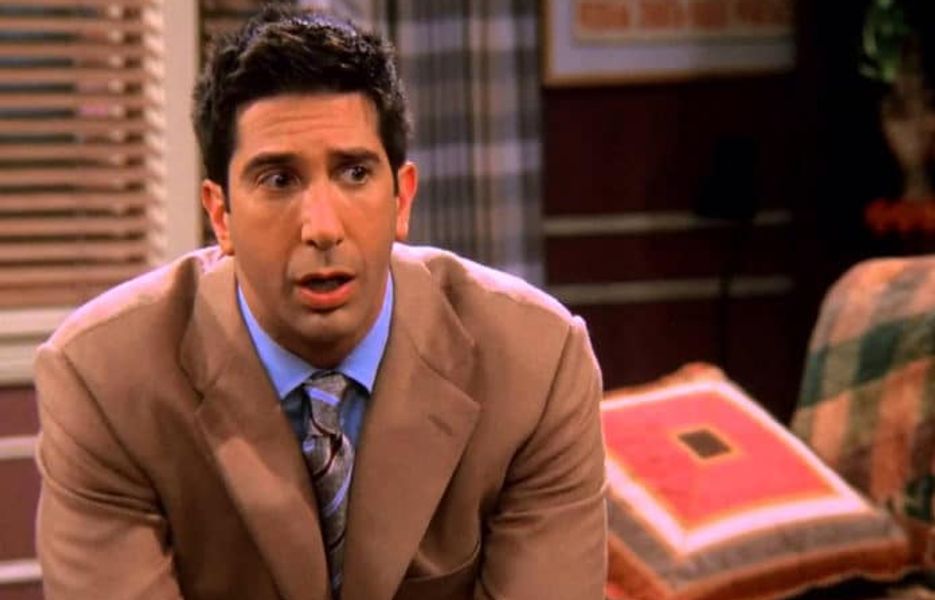“I don’t want to get over her. I want to be with her.” – Ross Geller, Friends
Created by David Crane and Martha Kauffman, Friends became a pop-cultural phenomenon, reigning supreme in the realm of television for a decade, from 1994 to 2004. Not only did it open up various avenues to explore for other sitcoms, leaving behind a rich legacy that was a close study of the urban lives of mid-20 to early 30-year-olds, but it also gifted the world a stellar cast whose careers skyrocketed ever since. With some of the most fantastic characters, namely Monica and Ross Geller, Chandler Bing, Joey Tribbiani, Rachel Green and Phoebe Buffay, the show opened various avenues for the actors.
Obsessed with Rachel and the user of the phrase “not all men [are like that]”, the protector of male ego and the fervent supporter of homophobic sentiments, Ross Geller is one of the main leads in the TV show and the original nice guy of ’90s television.
Played by David Schwimmer and a palaeontologist by profession, Ross seemingly has it all together at the beginning of the series. He is the kind of guy you could take home for your mother’s approval. However, if we delve deeper into Ross’ character, we will surely notice the abundance of red flags that scream at us throughout the series. His fragile male ego and insecurities are just some of the toxic traits of his nice guy syndrome.
We initially feel sorry for Ross when he gets dumped by his wife, who discovers her latent homosexuality, and repeatedly loses his turn to ask out his childhood sweetheart, Rachel. But when he finally manages to find a sweet woman named Julie, he cheats on her by kissing Rachel when he finds out the latter has feelings for him. Worse, Ross is the most toxic boyfriend ever who has no sense of personal space or boundaries. He is jealous of Rachel’s burgeoning relationship with her co-workers, encroaches on her private space and embarrasses her on the professional front.
Ross Geller-apologists will argue that Ross and Rachel were on a break but does a few hours of contemplation push you into the arms of another woman? Rachel would disagree. He even has no respect for her job and goes to great lengths to prevent her from taking up her dream job in Paris at the end of the series. He questions her abilities as a single mother and often alludes to her past as a spoiled brat, a persona Rachel shed long ago. We cannot ignore the list he made with his friends about Rachel, where he looked down upon her for her profession of being “just a waitress” in the second season. Under the guise of being her “lobster”, his controlling and manipulative behaviour is something that we conveniently ignore when their ship finally sails after a turbulent voyage for ten long seasons.
Ross says the wrong name at the altar in his marriage to Emily and later jokes about it. It makes us wonder who this guy is and why do we even like him? He makes various questionable decisions that range from dating his student, who is barely legal, to making out with his friend’s mother and sleeping with the said friend’s ex.
Ross’ narcissism stops him from being a better person. He is too self-absorbed and does not think twice before pushing others under the bus. As it is, the Geller parents are pretty toxic towards Monica and gush over Ross; the latter makes no considerable effort to shield his baby sister from their constant scrutiny and torment and even joins the ‘Let’s all fat-shame Monica’-squad. He is too busy trying to prove he is “man” enough and makes derogatory comments regarding the LGBTQ+ community, often dissuading his son Ben from playing with dolls and later preventing Rachel from hiring a male nanny as he felt uncomfortable being in the presence of a “sensitive” guy. Toxic, much?
While he might be defended on the grounds of his trust issues being rooted in his first wife’s infidelity and discovery of lesbianism, Ross’ lack of effort to mend his behaviour is appalling. His low self-esteem and insecurities affect his loved ones as he tends to project them onto others. He victimises himself in these situations, resorting to his gawky phase as an adolescent who faced plenty of female rejection.
Ross Geller’s barely hidden homophobia and lack of respect seep through the cracks plenty of times. His god-complex coupled with his low self-esteem makes him a funny mix of embarrassing male fragility. While we respect all the Ross-Rachel lovers out there, Geller is undoubtedly one of the most toxic characters in ’90s television!
